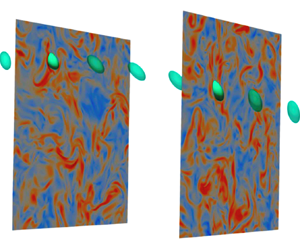Article contents
Dynamics of finite-size spheroids in turbulent flow: the roles of flow structures and particle boundary layers
Published online by Cambridge University Press: 30 March 2022
Abstract

We study the translational and rotational dynamics of neutrally buoyant finite-size spheroids in hydrodynamic turbulence by means of fully resolved numerical simulations. We examine axisymmetric shapes, from oblate to prolate, and the particle volume dependences. We show that the accelerations and rotations experienced by non-spherical inertial-scale particles result from volume filtered fluid forces and torques, similar to spherical particles. However, the particle orientations carry signatures of preferential alignments with the surrounding flow structures, which are reflected in distinct axial and lateral fluctuations for accelerations and rotation rates. The randomization of orientations does not occur even for particles with volume-equivalent diameter size in the inertial range, here up to  $60$ dissipative units (
$60$ dissipative units ( $\eta$) at Taylor-scale Reynolds number
$\eta$) at Taylor-scale Reynolds number  ${Re_{\lambda }=120}$. Additionally, we demonstrate that the role of fluid boundary layers around the particles cannot be neglected in reaching a quantitative understanding of particle statistical dynamics, as they affect the intensities of the angular velocities and the relative importance of tumbling with respect to spinning rotations. This study brings to the fore the importance of inertial-scale flow structures in homogeneous and isotropic turbulence and their impacts on the transport of neutrally buoyant bodies with sizes in the inertial range.
${Re_{\lambda }=120}$. Additionally, we demonstrate that the role of fluid boundary layers around the particles cannot be neglected in reaching a quantitative understanding of particle statistical dynamics, as they affect the intensities of the angular velocities and the relative importance of tumbling with respect to spinning rotations. This study brings to the fore the importance of inertial-scale flow structures in homogeneous and isotropic turbulence and their impacts on the transport of neutrally buoyant bodies with sizes in the inertial range.
- Type
- JFM Papers
- Information
- Copyright
- © The Author(s), 2022. Published by Cambridge University Press
References
REFERENCES
- 4
- Cited by



